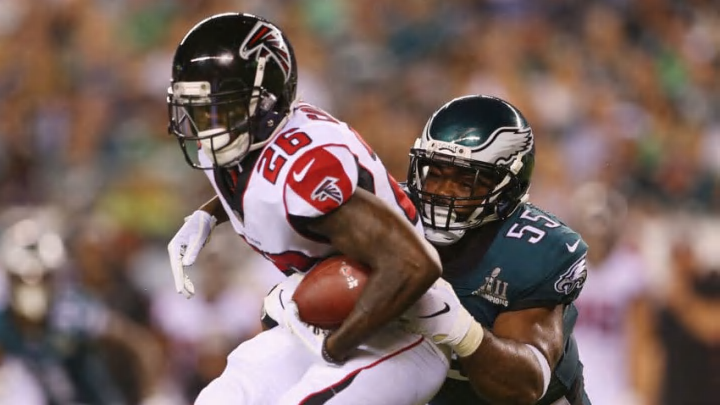According to Ian Rapoport, the Philadelphia Eagles passed on Tevin Coleman in free agency because the price was too expensive. Wait, what?
In case you haven’t heard, the Philadelphia Eagles just pulled off a low-key blockbuster trade to acquire Jordan Howard from the Chicago Bears (more on that here).
On paper, there really is no downside to the move, as the Eagles have in all likelihood secured their lead rusher for the 2019 season for the cost of a 2020 sixth-round pick, finally giving the team a balanced offensive assault for the first time in the Doug Pederson-era.
However, while discussing the move, the NFL Network’s Ian Rapoport let slip a fascinating tidbit about what facilitated the trade, namely that Tevin Coleman was too expensive in free agency.
From Up to the Minute Live: Explaining why the #Bears trade of RB Jordan Howard to the #Eagles makes sense for both sides. pic.twitter.com/QUs2ZCX33F
— Ian Rapoport (@RapSheet) March 29, 2019
What?
For those unaware of the Atlanta Falcons‘ former number two rusher, Coleman was a favorite hypothetical target of many Eagles fans due to his size (6-foot-1, 210 pounds), speed (4.39 40), and versatility in the passing game (92 catches for 1010 yards). A former Indiana star rusher, coincidentally leaving one season before Howard came to town, many projected that Coleman could take on an expanded role given an opportunity to headline a running backs rotation and could be the steal of free agency.
And he could very well still be; only it will be for the San Francisco 49ers, not the Philadelphia Eagles.
After failing to land a deal during the first few days of free agency, Coleman signed a two-year contract with the club worth up to $8.5 million to join Kyle Shanahan‘s already overloaded offensive stable of weapons.
I’m sorry, but what about that contract is too expensive?
Sure, one could argue that committing a non-insignificant amount of money to a player who has only rushed for 2,340 yards on his career, 1,030 less than Howard in one less year is risky, but putting the dollars aside, the team actually gave up much more to acquire Howard than they would have for Coleman.
You see, this season is Howard’s last on his rookie deal, in which he’ll be making about $2 million. If he continues to produce at his current clip, 1123 yards on about 260 carries and eight touchdowns, Howard is going to get paid.
Will he earn a Le’Veon Bell-esque contract in March of 2020? Nope, but he should certainly outpace Mark Ingram, another power rushing bowling ball who just signed a three-year, $15 million deal with the Baltimore Ravens.
If the Eagles can’t afford Coleman at $4.5 a year, how will they be able to afford Howard at, say, $6?
Granted, maybe Howie Roseman could work his magic and will some money into existence with fake future contract years, his current favorite cap sidestepping method (more on that here), but what if Howard isn’t going to be the Eagles’ long-term answer at the position at all? What if he’s just a one-year stop-gap?
I mean think about it, Roseman was willing to ship out a third-round pick to procure Golden Tate for 10 games last season only let him walk in free agency six months later. Howard should provide even more value than Tate next season, or even Jay Ajayi over his abbreviated tenure with the team, and could provide a similar compensatory selection if he were to walk in free agency (a third or fourth rounder).
Signing Tevin Coleman, on the other hand, would have cost the Philadelphia Eagles in the compensatory formula, much more than the 2020 sixth, or even fifth round pick Jordan Howard cost to acquire. Huh, I guess Ian Rapoport was right after all.
